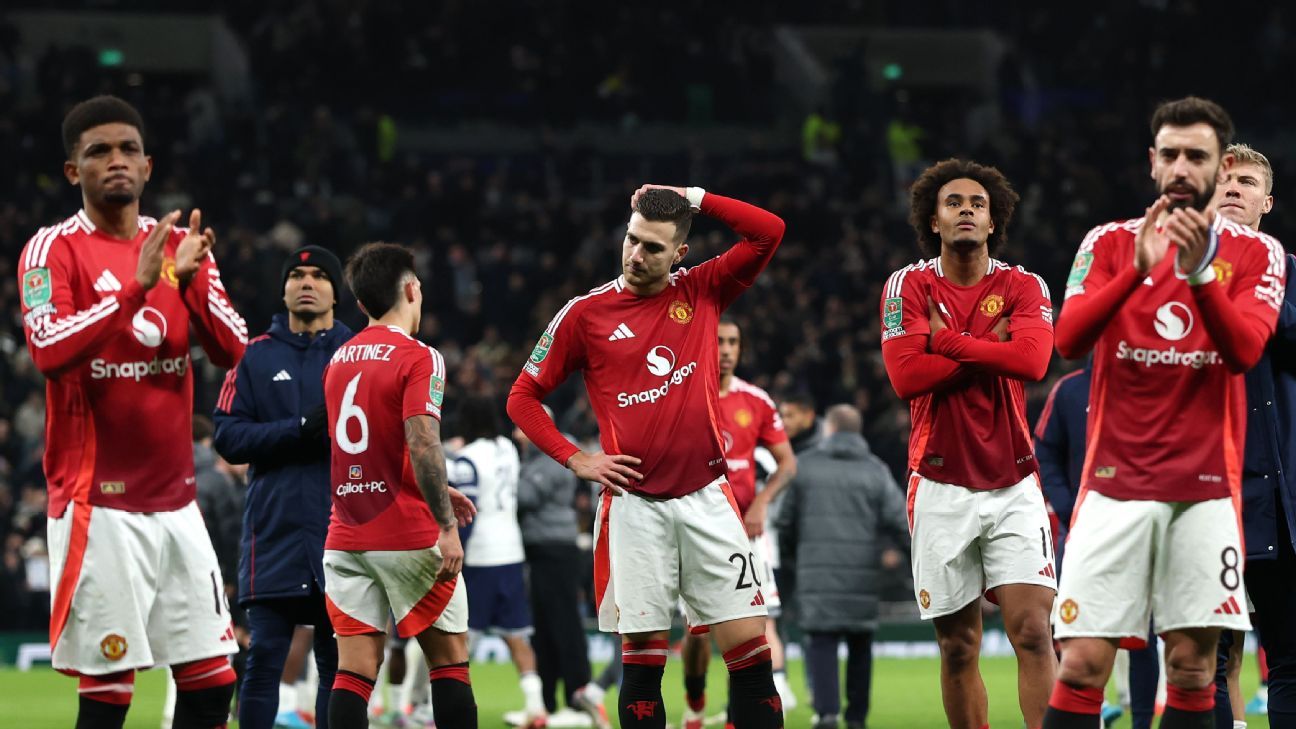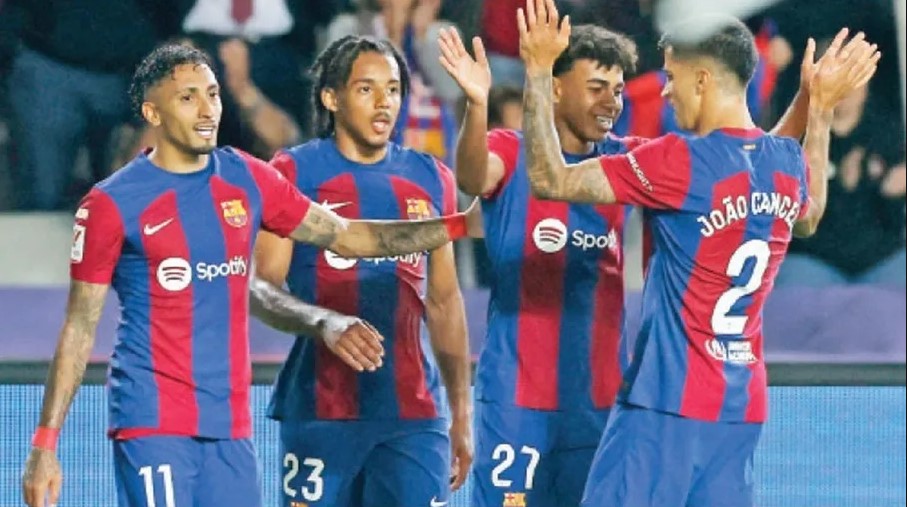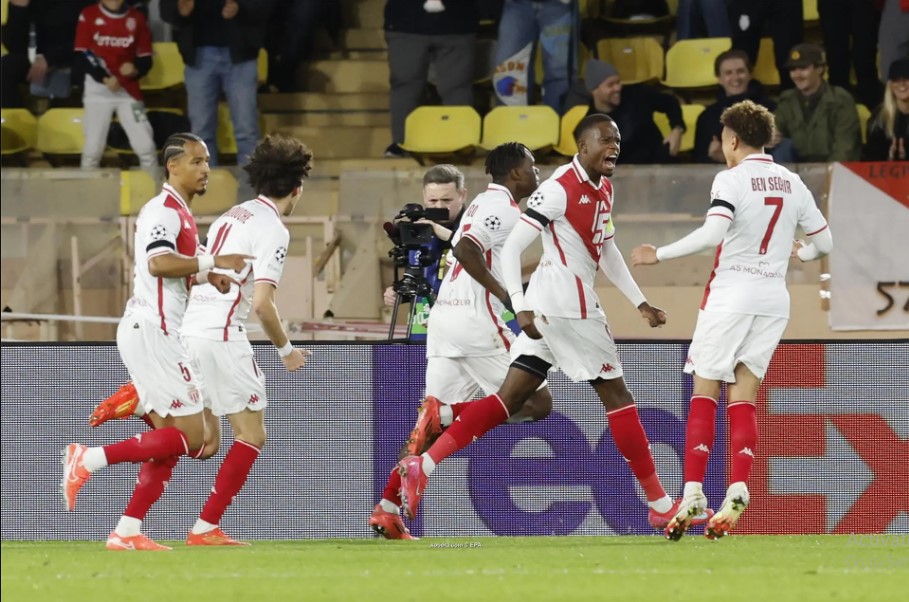Man United’s path to relegation in the Premier League explained
https://a.espncdn.com/combiner/i?img=%2Fphoto%2F2024%2F1219%2Fr1429977_1296x729_16%2D9.jpg
After Manchester United wrapped up their worst year since the Premier League was created — just 51 points in 2024! — new manager Ruben Amorim decided to take it a step further.
“I think people are tired of excuses in this club and I think sometimes I talk about relegation because of that,” he said after the year-end loss to Newcastle,. “We have to acknowledge our position the way you see the league, that everybody can beat everybody, so we have to win games and to focus on surviving. I think our club needs a shock, you know? It needs a shock and we have to understand that.”
Man United, of course, followed that up with a 2-2 draw away to league leaders and eternal rivals, Liverpool. And they then knocked Arsenal out of the FA Cup on penalties. Those results suggest there might be better things just around the corner — but at the same time, a draw is only worth a point, and a single point only goes so far for a team in a relegation battle. Even with these games, Man United sit seven points above the bottom three in the Premier League table.
So, are United actually at risk of relegation? Mark Ogden and Ryan O’Hanlon have teamed up to take stock of where the club are, what the historical context for United’s struggles might be, and what would have to happen for the team with the most Premier League titles to fall out of the top flight.
A historically bad Premier league season with relegation precedent
Manchester United are the most successful team of the Premier League era, winning 13 titles since the competition began in 1992-93. Until the retirement of manager Sir Alex Ferguson in 2013, the team had never finished a Premier League season lower than third.
Even throughout the turbulent decade since Ferguson stepped down after 27 years in charge, United’s lowest final position was the eighth-place finish under Erik ten Hag last season.
To place that into context, of United’s Big Six rivals, Liverpool are the only other side never to have finished outside the top 10, with their lowest position also eighth, in 2012-13 and 2015-16. Arsenal (12th), Chelsea (14th), Tottenham (15th) and Manchester City (relegated 1996 and 2001) have all recorded bottom-half finishes during the Premier League era.
Relegation for the biggest clubs in the Premier League simply doesn’t happen anymore. United were last relegated in 1974, but Arsenal (1913) and Liverpool (1954) have even longer unbroken stretches in the top flight. Tottenham last suffered relegation in 1977, while Man City and Chelsea — mid-ranking clubs until bought by wealthy owners during the 2000s — were most recently relegated in 2001 and 1988 respectively.
So, Man United have nothing to worry about, right? Well despite a morale-boosting 2-2 draw against Liverpool at Anfield in their last Premier League game — a result which ended a sequence of three successive league defeats without scoring — United are in the midst of their worst-ever league season, having already hit a series of dismal lows.
The team ended 2024 with just 51 points during the calendar year — their lowest Premier League calendar year tally by a margin of seven points — and it was the worst haul since Ferguson’s team managed 50 points in 1989.
United’s six losses in December were the most suffered by the club during a calendar month since September 1930 and they conceded 18 goals, tying the most they’ve allowed from March 1964.
Having replaced the fired Ten Hag in November, Amorim earned the dubious distinction of recording the worst start by a United manager for 103 years after a 2-0 home defeat against Newcastle on Dec. 30. The loss left the Portuguese coach with five defeats in eight league games and prompted him to say that relegation was a possibility for the club.
So, how realistic is the prospect of relegation? It remains unlikely, simply due to United’s resources, fanbase and under-performing players who might come good. Plus, there’s the fact they face bottom-club Southampton on Jan. 16 with enough distance between themselves and the relegation zone to feel confident enough that they will soon banish talk of the drop.
But all of the above, aside from the points cushion, applied during the winter of the season 1973-74 season in the old First Division — then the top flight of English football. United had been crowned European champions in 1968, a year after winning the league title, becoming the first English club to win the European Cup/Champions League in doing so. But by 1973-74, they were in a tailspin towards relegation.
Let’s just think about that timescale: less than six years. For a modern-day comparison, United’s situation in 1973-74 would be like Liverpool being in a relegation battle this season having won the Champions League in 2019. On New Year’s Day 1974, United lost 3-0 away to Queens Park Rangers and dropped into the bottom three. By mid-January, they had dropped another position, to second bottom.
After a New Year’s Day defeat, The Times reported that United resembled “a team of rags and tatters largely devoid of understanding or confidence with a defence that resembled a sieve,” despite “spending over £1 million on players over the last 18 months.”
Sound familiar? An expensively-assembled squad failing to perform and suffering a series of bad defeats with a porous defence — that could be Amorim’s team right now rather than Tommy Docherty’s doomed side in 1974.
1:43
Could Manchester United really be relegated?
Ruben Amorim shockingly answers questions about whether or not Manchester United are in a relegation fight following a 2-0 defeat to Newcastle United at Old Trafford.
Docherty had been hired as United manager in December 1972, becoming the third permanent appointment since the retirement of legendary manager Sir Matt Busby three years earlier. Busby had left behind an ageing team, the club hired ill-equipped managers to replace him and great players of the previous era moved on and were replaced by inferior, but costly, new signings. Docherty arrived with a big reputation, but he couldn’t turn the situation around and United were relegated at the end of the 1973-74 season.
“One minute I had got the United job and I was standing in the centre of the pitch, looking around and humming the lyric ‘You were meant for me,'” Docherty told The Independent in 2014. “The next minute I knew I would always be known as the man who took United into the Second Division.”
Denis Law, one of the great players of the Busby era, confirmed United’s relegation by scoring against them for Manchester City in a 1-0 win at Old Trafford in April 1974. Law was distraught by the impact of his goal as evidenced by his pained reaction.
The good news for United was that their relegation sparked a rebirth, with Docherty retained as manager and backed to rip the team apart and build a vibrant young side which won promotion after just one season in the second tier.
United returned to the top division in 1975 and have been there ever since, but if Amorim is right and they end up in a relegation battle again, it would be the biggest story in the history of English football if the club ends up going down this season. — Mark Ogden
How do you get relegated from the Premier League?
There’s one simple metric that will determine whether or not your team get relegated: Can you average one point per match? Draw 38 in a row? Win 12, draw two, lose 24? However you do it, getting to 38 points has been enough to survive in every Premier League season since 2017-18.
That’s a simple rule of thumb, and if you’re a team genuinely worried about getting dumped out of the Premier League, it even provides you with enough wiggle room. Since 2017-18, the “best” team to be relegated was Burnley in 2021-22, who picked up 35 points. Meanwhile, the worst team — no quotation-marks needed — to stay up over that stretch was Aston Villa in 2019-20, who also won 35 points.
So, if you were, say, a sporting-goods-store magnate who was trying to invest the absolute bare minimum possible into your team without getting relegated before you eventually sold the club to, I don’t know, an oil-rich sovereign wealth fund, you would aim to build a side that won 36 points every season. That’s been just enough to stay up in each of the past eight seasons.
But is there a “best” way to go about hitting that 36-point threshold?
The most goals scored by a relegated team since 2017-18 was Luton Town’s 52 last season. Unfortunately, they paired that with the second-worst Premier League defense of this era — beaten only by fellow 2023-24 relegatees Sheffield United, who conceded 104. On the other end, the “best” relegated defenses were 2021-22 Burnley and 2020-21 Fulham, who each conceded 53 times.
Flipping the lens inside out: The worst attack to stay up was Huddersfield, when they scored just 28 times during the 2017-18 season. The worst defense, meanwhile, will surprise nobody: Marcelo Bielsa’s 2021-22 Leeds side who conceded 79 times — eight more than any other team that has avoided relegation since 2017-18.
So what’s more important: scoring, or stopping the other team from scoring? Well, 15 of the 21 relegated teams scored more than Huddersfield’s 28, and 17 of the 21 relegated teams allowed fewer than Leeds’ 79. Looking at it the other way: 53 non-relegated Premier League teams since 2017-18 have scored fewer than Luton’s relegation-best 52, while 55 non-relegated teams have allowed more than Burnley and Fulham’s relegation-best 53.
In other words, teams have survived and been relegated in all kinds of ways. Logic would seem to suggest that it’s easier to organize a solid defense than to conquer the dynamic, interlocking puzzle that is open-play attacking at the highest level, but bad defenses and bad attacks have both survived the drop since 2017-18.
But what does the average relegated team look like? Let’s take the 18th-place finisher from the last seven seasons and paint the picture. This is what you need to be better than if you want to stay in the Premier League:
• Goals: 1.0 per game
• Goals allowed: 1.69 per game
• Goal difference: minus-0.69 per game.
So, over a full season, you’ll need to play at a higher level than a team that scores 38 goals and concedes 64 — or gets outscored by 26 goals from August through May. That’s not a high bar to clear, especially when you’re Manchester United, a club with more money than just about any other team in the world. — Ryan O’Hanlon
Do Man United really believe they are in a relegation battle now?
Amorim was hired as head coach by Man United in November. The 39-year-old had transformed the fortunes of Sporting CP, ending the Lisbon club’s 19-year wait to become Portuguese champions in 2020-21 before winning another title in 2023-24. Amorim was hired to make United competitive again and revive the club as he did with Sporting.
But less than two months after arriving at Old Trafford, Amorim declared that relegation, rather than success, was the immediate issue at the club. Amorim had warned, after a bright start of two wins and a draw in his first three games, that a “storm was coming.” He was right.
“If you look at the table, we are closer to the relegation than the first place,” Amorim said after a 2-0 defeat against Newcastle on Dec. 30. “That [relegation] is a possibility, but I’m not thinking about that, I just want to look at the next game. I just think it’s really, really important to be really clear with the players and the supporters.”
The next game was a 2-2 draw at Liverpool, but even though United played well — arguably their best performance under Amorim — they ended the weekend in 13th, still uncomfortably close to the bottom three and the relegation zone.
1:13
Amorim admits Manchester United’s fans and players are ‘suffering’
Ruben Amorim takes the blame for Manchester United’s 3-0 home defeat to Bournemouth.
Amorim said after the game that he was “really upset” by the performance due to his concern that his players were able to raise their levels against Liverpool, and also against Manchester City following their 2-1 win at the Etihad in December, yet play so poorly in defeats against Bournemouth, Wolves and Newcastle.
The issue of inconsistency also prompted a pointed reaction from captain Bruno Fernandes after the Liverpool game, who expressed worry about Man United facing last-placed Southampton.
“I’m pretty upset because if we showed this today against Liverpool, why can’t we do this every week?” Fernandes said. “I wasn’t worried about people putting in effort because it’s Liverpool, everyone’s going to try to do their best. I’m more worried about Southampton [United’s next Premier League opponents].”
Amorim’s comments about United potentially facing a relegation battle have had an impact on the players, however. Wing-back Diogo Dalot says that the coach’s blunt assessment has sharpened the focus of the squad.
“I think it [Amorim comments] changed the approach,” Dalot told reporters after the Liverpool game. “Obviously when you don’t win games the confidence is not the same. Football teams live by wins, by confidence, especially a club like this.
“The situation that we are in, from the last month we really didn’t realise what the situation was and I think today we showed that we want to get out of it. To get out of it, the minimum that we need to show is the attitude that we showed against Liverpool, the fighting spirit and the winning duels.”
Within the club, there is a sense that United are enduring a painful, but necessary, transition from the old regime under majority owners, the Glazer family, to the more-structured approach of the INEOS-led minority shareholders who took full control of football operations at Old Trafford last February.
In less than 12 months, United have extended Ten Hag’s contract as manager and then fired him, replacing the former Ajax coach with Amorim. Senior executives have been come and gone — several figures from the Glazer regime left last summer — while Dan Ashworth, hired as director of football after a lengthy compensation battle with previous club Newcastle, was fired after just five months in his role last month.
INEOS have also instigated job cuts leading to over 200 redundancies throughout United in cost-cutting measures and the club remains in a state of flux off the pitch, where money is tight — the club posted a loss of £113.2m in their annual accounts last November — and much-needed new signings unlikely as a consequence.
On the pitch, with results under Amorim lurching from between extreme highs and lows, the saga over the future of star striker Marcus Rashford — United’s highest-paid player on a salary of £325,000-a-week — continues to be a distraction. Rashford was dropped by Amorim for the 2-1 win at Manchester City and hasn’t played since.
The 27-year-old forward has gone on record to say that he wants a “new challenge” and is expected to leave, but United have had little firm interest in the England player. As one United source told ESPN when asked about the situation right now: “It’s f—ing tough. There are going to be periods like this until we get to the summer.”
When the summer comes, United will look to reshape their squad and sign players more suited to Amorim’s 3-4-2-1 formation, but they have to get to that point with a squad that has shown itself to be inadequate, inconsistent and prone to defeats against less-fancied opposition.
And that is why Amorim is worried about the shadow of relegation. — Ogden
So, United won’t actually get relegated … right?
Through Amorim’s nine league matches in charge, United’s goal production doesn’t look that far off from the average 18th-placed team we outlined earlier:
• Goals: 1.2 per game
• Goals allowed: 1.8 per game
• Goal difference: minus-0.6 per game
So, they’ve scored goals at an above-relegation rate but conceded goals at a slightly-worse-than-relegation rate, and it adds up to a team that have been ever so slightly above the goal-ratio pace of the average 18th place team over the past seven years.
But from a pure points-per-game perspective, they haven’t hit that magic point-per-game mark under Amorim. They’ve taken just eight points from nine matches, which would add up to 34 points — or fewer than the lowest total recorded by a non-relegated team since 2017-18.
If United won points at this pace for the whole season, they would — yes — typically be relegated.
But there are a couple problems with that. First, they won 15 points from the 11 matches managed between Ten Hag and interim boss Ruud van Nistlerooy, so that puts them up in the lofty heights of 23 points from 20 games — or at about a 44-point full-season pace. Second, matches against Liverpool, Arsenal, and Manchester City have made up 33% of the Premier League schedule Amorim has faced so far. Going forward, the rate of “playing Arsenal, Liverpool, or Manchester City” drops down to 11%.
Plus, the doomsday-scenario here assumes that Manchester United will not improve. Amorim is trying to install a completely new system on the fly — a process that hopefully leads to some long-term improvement in exchange for the short-term pain we’ve just described. On top of that, United’s performances have been a little bit better than their results — they’ve conceded 16 goals from 13.35 expected through Amorim’s first nine matches.
But perhaps the biggest reason United are not really at risk of relegation is that there are a lot of other bad teams in the Premier League right now. Per the implied point totals from Sporting Index, Southampton are projected to finish last on 19 points, followed by Leicester City on 28, and then Ipswich Town on 32. In fact, Wolves are projected to finish 17th with a point total, 34, that leads to relegation in most seasons.
So, to get relegated, United would have to significantly underperform at least two of those teams and then also the trio of Everton, Crystal Palace, and West Ham — all of whom currently sit below Amorim’s side in the table. As such, ESPN Bet puts United’s relegation odds at +4000 — an implied 2.4% chance of going down. That’s before accounting for the vig, so the odds are really even lower than that.
And thus, both the problem and, somehow, the saving grace are one in the same: With all the money that the club generates, you could let a 12-year-old equipped with nothing more than a copy of EA Sports FC and an Xbox run Manchester United, and they still probably wouldn’t get relegated. — O’Hanlon
[/gpt3]






Post Comment